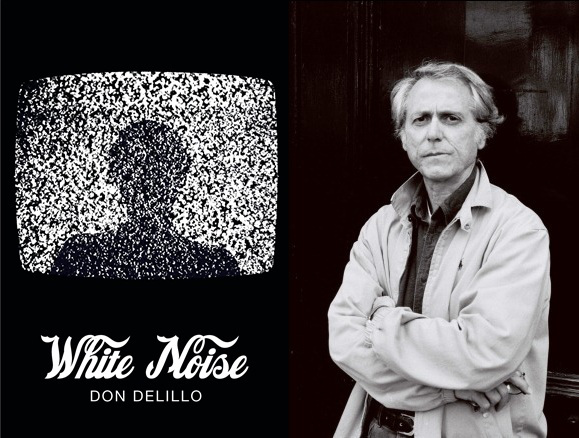And now for something completely different: a 333-word book review. Up for brief discussion is Don DeLillo’s (one of my favorite authors) breakthrough postmodernist work, “White Noise.” It comes close to being a masterpiece of modern American literature, but not quite. Almost. The full DeLillo experience comes together beautifully in “Underworld,” which is a work that few novels can hold a candle to, in this or any era.
White Noise by Don DeLillo Published in 1985 Grade: A333-word review by Colin Hart
Don DeLillo has an unbelievable way with words, perhaps the greatest wordsmith of the last quarter of the 20th century (1975—1999). He can turn everyday occurrences into postmodern pastiches of philosophical candor, an ear for eloquence and an eye for empathy.
White Noise (1985) is the definitive postmodern novel, explicitly focused on the central pillar of postmodernity: information overload. The “white noise” all around us is bleeding us dry: the nuclear family destroyed, the intelligentsia shoved up its own ass. Of course, DeLillo operates on a much larger canvas—the entirety of human existence. All his novels, in one way or another, reach for the stars and then some, and most of them do indeed grasp multitudes. Only a select few are able to grasp it all, but when he does, Don DeLillo is almost unequaled in modern literature.

The plot—as main character Jack Gladney will have you know—is not what is important. It is episodic, with plenty of philosophical digressions that hit home because they are both universal and true. The chapters are short, but very effective. DeLillo is often at his best when the signature DeLillo-style is packaged into short potent poetic bursts of wit. The beauty of his writing is then plain to see—not a word mistimed, not a single digression wasted.
The elements that set it apart from similar literature, and from DeLillo’s other works, are the cracks in the seams. Soon, information overload bleeds into DeLillo’s prose and Jack Gladney’s subconscious. Advertisements appear like commercials; the supermarket is enshrined as a religious postmodern institution. The ambiguous, symbolist ending is filmic to the point where DeLillo directs rather than writes, as the camera’s POV jumps around as a toddler rides his bicycle across a freeway.
This isn’t his masterpiece—that honor belongs to the monumental Underworld—yet this is still a mesmerizing book. It’s a Big Book, in terms of weighty meaning, and also a 1980s contender for Great American Novel.
One of DeLillo’s best.
Some of my favorite lines/passages:
“Nearly seven straight hours of serious crying. It was as though he’d just returned from a period of wandering in some remote and holy place, in sand barrens or snowy ranges—a place where things are said, sights are seen, distances reached which we in our ordinary toil can only regard with the mingled reverence and wonder we hold in our reserve for feats of the most sublime and difficult dimensions.” (page 79)
“May the days be aimless. Let the seasons drift. Do not advance the action according to a plan.” (page 97)
“He had the look of a ladies’ man in the crash-dive of his career.” (page 234)
“She’d seen him sidle up to women in public places to ask some delving questions in his blank-faced canny way. She refused to go into restaurants with him, fearing his offhand remarks to waitresses, intimate remarks, technically accomplished asides and observations, delivered in the late-night voice of some radio ancient. He’d given her some jittery moments, periods of anger and embarrassment, in a number of leatherette booths.” (page 235)
“‘Don’t worry about me,’ he said. ‘The little limp means nothing. People my age limp. A limp is a natural thing at a certain age. Forget the cough. It’s healthy to cough. You move the stuff around. The stuff can’t harm you as long is it doesn’t settle in one spot and stay there for years. So the cough’s all right. So is the insomnia. The insomnia’s all right. What do I gain by sleeping? You reach an age when every minute of sleep is one less minute to do useful things. Never mind the women. The women are all right. We rent a cassette and have some sex. It pumps blood to the heart. Forget the cigarettes. I like to tell myself I’m getting away with something. Let the Mormons quite smoking. They’ll die of something just as bad. The money’s no problem. I’m all set incomewise. Zero pensions, zero savings, zero stocks and bonds. So you don’t have to worry about that. That’s all taken care of. Never mind the teeth. The teeth are all right. The looser they are, the more you can wobble them with your tongue. It gives the tongue something to do. Don’t worry about the shakes. Everybody gets the shakes now and then. It’s only the left hand anyway. The way to enjoy the shakes is to pretend it’s somebody else’s hand. Never mind the sudden and unexplained weight loss. There’s no point eating what you can’t see. Don’t worry about the eyes. The eyes can’t get any worse than they are now. Forget the mind completely. The mind goes before the body. That’s the way it’s supposed to be. So don’t worry about the mind. The mind is all right. Worry about the car. The steering’s all awry. The brakes were recalled three times. The hood shoots up on pothole terrain.‘” (page 243)
“A woman passing on the street said, ‘A decongestant, an antihistamine, a cough suppressant, a pain reliever.’” (page 250)
Final lines: “Everything that we need that is not food or love is here in the tabloid racks. The tales of the supernatural and the extraterrestrial. The miracle vitamins, the cures for cancer, the remedies for obesity. The cults of the famous and the dead.” (page 310)
Advertisements Share this:





